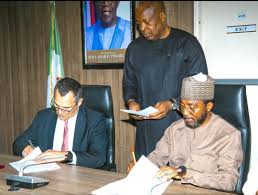Business
World Bank Seeks Poverty Eradication By 2030
World Bank President Jim Yong Kim has called for a commitment by the international community to end extreme poverty by 2030.
Kim also stressed the need to improve the lives of the most vulnerable people living in developing countries in this drive.
To reach that goal, Kim said the world would have to reduce the number of people living below the poverty line of 1.25 dollars per day to three per cent globally by 2030, and raise the per capita incomes of the bottom 40 per cent of every developing country.
The three per cent target marks a new goal for the World Bank, which did not provide directly comparable numbers for the current rate of extreme poverty.
The goal would help the World Bank prioritise development projects that have the biggest impact on the poorest and reduce inequality, Kim said.
“Now is the time to commit to ending extreme poverty,” he said in a speech before meetings of the World Bank and International Monetary Fund on April 19 and 20 in Washington.
“We are at an auspicious moment in history, when the successes of past decades and an increasingly favourable economic outlook combine to give developing countries a chance – for the first time ever – to end extreme poverty within a generation,” he added.
The World Bank’s board will consider a new country strategy for India next week that is aimed at reducing poverty by an additional 300 million over the next several years.
An estimated 50 million people were lifted out of poverty in India over the past five years.
Economists have estimated the poverty rate for the developing world in 2012 at about 19 per cent, representing about 1.1 billion people. That is down from 21 per cent in 2010, or about 1.2 billion people.
The overall poverty rate has been falling by about one percentage point a year from 1981 to 2010, according to World Bank data.
The rise of countries like China, India and Brazil has lifted hundreds of millions of people out of poverty, according to the World Bank and the U.S.
However, most of the success in reducing poverty has been in China, while regions such as South Asia and sub-Saharan Africa still struggle with high poverty levels.
Fragile states, such as Afghanistan, are also still mired in poverty.
World leaders have called for an end to extreme poverty, including U.S. President, Barack Obama and Malawi’s new leader, Joyce Banda.
Brazilian President Dilma Rousseff, said last month Brazil was close to eradicating extreme poverty through a flagship cash transfer programme for the poor that is being replicated in other countries.
The focus on poverty targets comes as a high-level panel is working on a new global development framework that looks beyond the 2015 UN Millennium Development Goals of halving global poverty and hunger.
Kim said economic growth was important but not enough to cut poverty and shrink the growing gap between rich and poor.
Business
Eazipay Offers Zero-Interest Loans To 150,000 SMEs, Employees

With a mission to ignite growth, encourage business continuity and help businesses and employees thrive, Eazipay is gearing up to propel the dreams of 150,000 SMEs and employees to new heights through her relief fund.
Gone are the days of financial constraints and stifled dreams. With Eazipay’s support, SMEs and employees alike can bid farewell to limitations and embrace a world of endless possibilities.
Whether it’s start up, business expansion or personal development, Eazipay is here to make dreams come true.
The mind-blowing initiative, which kicked off this month, would end in December, and will also offer a range of perks and benefits designed to put a smile on the faces of SMEs and employees alike.
From exclusive discounts to various advisory services and beyond, Eazipay is committed to spreading happiness and creating lasting impact in people’s lives and to the growth of businesses.
The technology company which offers products and services that range from payroll management to IT/Device management and assessments, “Eazipay isn’t just providing financial support but also unleashing a wave of growth and prosperity for SMEs and employees across the nation.
“Interested businesses and individuals can take part in this initiative directly from the Eazipay website: www.myeazipay.com”.
Business
SMEs Critical For Sustainable Dev – Commissioner

The Commissioner of Finance, Lagos State, Abayomi Oluyomi, has described Small and medium Enterprises (SMEs) as a critical engine for sustainable development in any economy.
He said this recently at the 10th anniversary of the Alert Group Microfinance Bank and the opening of their new head office in Lagos.
According to the National Bureau of Statistics, SMEs accounted for about 50 per cent of Nigeria’s gross.
He commended the positive impact of the Alert MFB as it empowers SMEs in the State.
“Alert MFB in the past 10 years has been at the forefront of empowering SMEs in Lagos State, disbursing over N30bn in loans to over 30,000 individuals having small to medium businesses over that period, which is quite remarkable”, he said.
Speaking, the Group Managing Director of Alert Group, Dr Kazeem Olanrewaju, revealed that the financial institution commenced business in 2013 as a microfinance bank.
“We started this journey in 2013 and it has been expanding. Today, they have about 10 branches across Lagos. They have supported well over 30,000 clients and have disbursed over N30bn.
“The company has been profitable since the second year. Looking at the market and the available opportunity, the Alert MFB board decided to come together to establish a Microfinance Institute (MFI), which is the Auto Bucks Lenders”, Dr. Olanrewaju said.
The GMD further stated that the company was focused more on supporting businesses and small and medium enterprises.
“The loan to support business represents over 98 per cent. The consumer loans you will see are the ones given to entrepreneurs. So, the area of focus of Alert MFB and Auto Bucks Lenders is to support businesses across the country.
“With the establishment of Auto Bucks Lenders, we have the opportunity to also do business outside Lagos. So, presently, we have offices in Ogun State and Oyo State. We intend to go to every part of Nigeria to support what we are doing”, he declared.
Business
Retailers Explain Price Drop In Cement Cost

The cement market, in the last couple of weeks, has seen a significant turnaround with prices tumbling from between N10,000 and N15,000 per 50kg bag to between N7,000 and N8,000.
The sudden rise in the prices of cement and other major building materials in February this year upsets the construction industry, especially in real estate, where many developers were forced to abandon building sites.
A recent market survey conducted by The Tide’s source in different locations across the country confirmed a price drop, ranging between N7,000 and N7,500 per bag, though BUA cement is selling for N7,500 to N7,800 per 50kg bag, depending on location.
Both entrepreneurs and major distributors who were interviewed, explained that the price drop is due to low demand and government’s intervention.
At the peak of the price hike, the Federal Government called a meeting with major producers where it was agreed that a bag of cement should be between for N7,000 to N8,000, depending on location.
But the producers did not comply with this agreement immediately, followin which “Nigerians stopped demanding for cement; many project sites were abandoned as developers sat back and waited for the prices to come down.
“So, what has happened is an inter-play of demand and supply with price responding, which is Economics at work”, Collins Okpala, a cement dealer, told the source in Abuja.
In the Nyanya area of the Federal Capital Territory, a 50-kg bag of Dangote cement now sells for between N7,000 and N7,500, while BUA cement sells for between N8,500 and N9,500, down from between N11,000 and N12,000 respectively.
In Lagos, the product has seen significant price drop too. In Ojo area of the state, Sebastin Ovie, a dealer, told our reporter that what has happened is a crash from the January price, attributing the crash to low demand and stronger naira.
“The current price of the product is between N7,000 and N7,500 per 50kg bag, depending on the brand. This is a significant drop from the average of N12,000 which most dealers were selling in February and March”, he said.
A dealer in Agege area of the state who identified himself as Taofik Olateju, told the source that sales are picking up due to the drop in price.
He recalled that Nigerians at a point stopped buying due to the high price of the product at N15,000 per bag.
“I am sure most dealers ran at a loss then because we had mainly old stocks which we wanted to offload quickly”, he said, confirming that the product sells for between N7,500 and N8,000, depending on the brand and the demand for the brand.
Continuing, Olateju noted that “because the naira is now doing well against the dollar, it will be unreasonable for manufacturers to continue to sell the product at the old prices. I also believe that the federal government’s intervention and the threat to license more importers may have worked, leading to the reduction in price”.
In Enugu, the source reports that the product sells for between N7,200 and N7,500 depending on the brand and location.
“This is a city where the price of a 50kg bag went for as high as N12,000 and N13,000 in some cases in February and March”, Samuel Chikwendu said.
He added that the prices of other building materials, especially iron rods, have also dropped considerably which is why, he said, activities are picking up again at construction sites.
The story is slightly different in Owerri, the capital of Imo State, where Innocent Okonkwo told the source that low demand was also driving the price drop, adding that a 50kg bag was selling for N9,000 on the average in the state.
Sundry market observers are optimistic of further price reductions, but they remain cautious as manufacturers, wholesalers, and retailers continue to play critical roles in setting prices for end-users.
They lamented, however, that despite Nigeria’s status as one of the largest producers of cement in Africa, the price of the product continues to rise, particularly in the face of high inflation impacting the building materials market generally.
Okpala in Abuja highlighted the variations arising from direct sourcing from manufacturers versus procurement through dealers, with traders holding old stocks selling products at prices ranging from N8,500, N8,300 to N8,000 per bag.
Lucy Nwachukwu, another dealer in Abuja, said the significance of procurement volume in determining cement costs, noting that stability in prices has been observed over the past month, with the product retailing for between N7,000 and N7,800 depending on the brand.
In Port Harcourt also, a customer, Daniel Etteobong Effiong, said the price goes between N7500 to N8500, depending on the brand and the location one is buying from.
-

 Maritime4 days ago
Maritime4 days agoNPA Secures $700m Citibank Loan For Tin Can, Apapa Ports Rehabilitation
-

 News4 days ago
News4 days agoJAMB Sanctions Officials For Asking Candidate To Remove Hijab
-

 News9 hours ago
News9 hours agoRHI: Lady Fubara Donates 50,000 Books To Public Schools In Rivers
-
Women8 hours ago
The Wise Woman
-

 Opinion4 days ago
Opinion4 days agoCautious Optimism As Naira Rebounds
-
News4 days ago
Waive Tax On Electronic Imports, Women Engineers Appeal To Tinubu
-
Niger Delta8 hours ago
Steer Clear Of NNS Delta, Commander Warns Criminals
-
Business8 hours ago
‘Gas Infrastructure Devt, Key To Energy Sector Growth’

